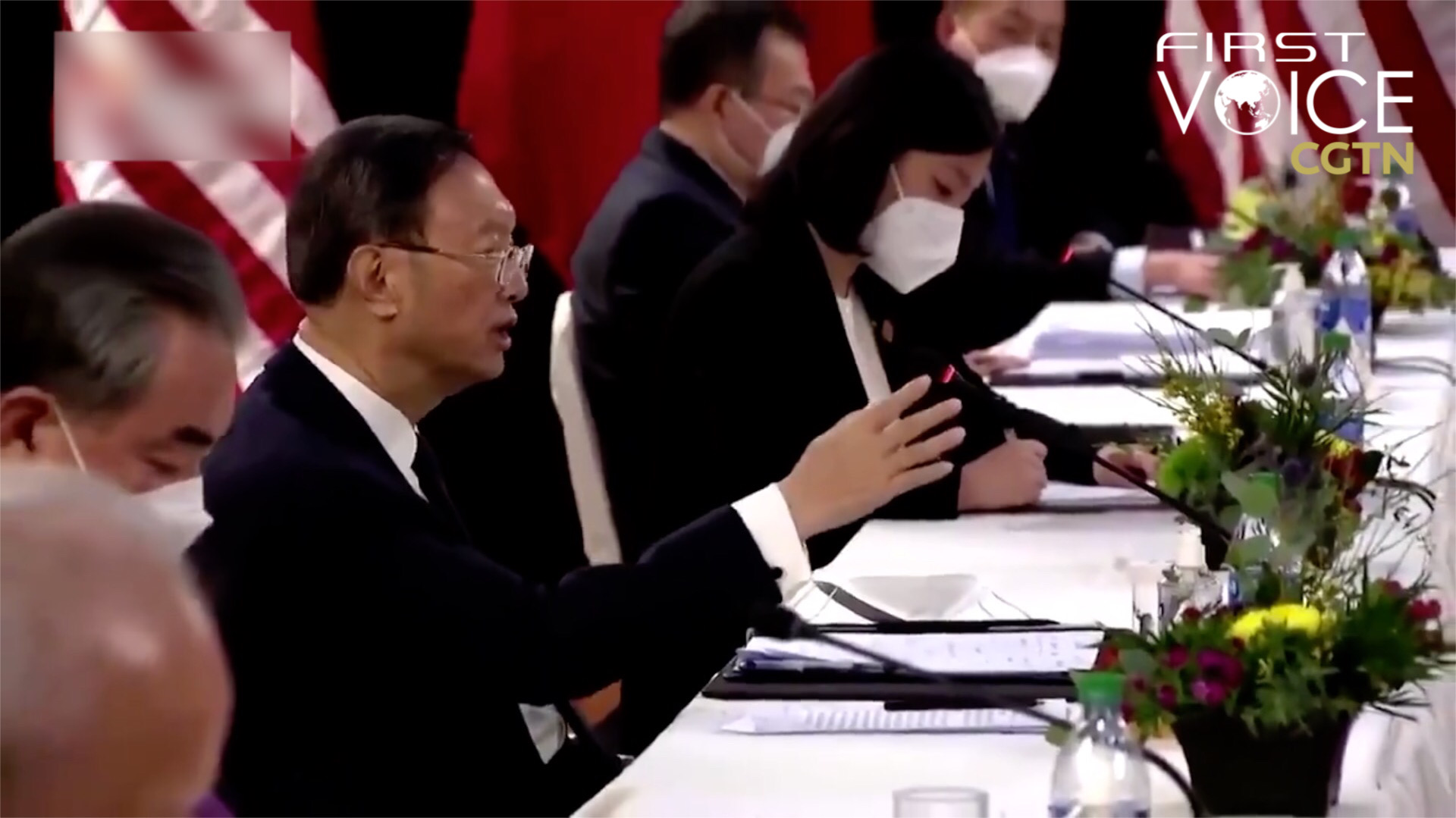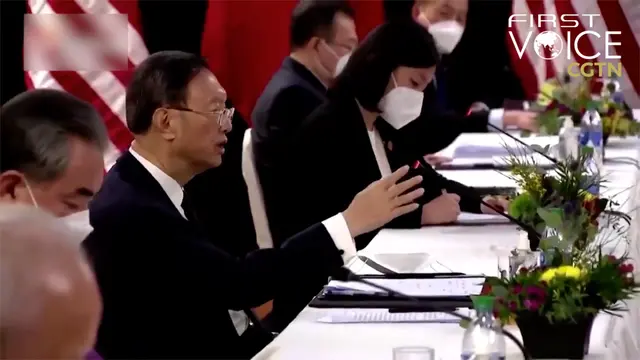
Editor's note: CGTN's First Voice provides instant commentary on breaking stories. The daily column clarifies emerging issues and better defines the news agenda, offering a Chinese perspective on the latest global events.
The first meeting between new U.S. Secretary of State Antony Blinken and his Chinese counterpart Yang Jiechi will be remembered for the fiery opening moments amid a chill in relations that has not been seen for decades.
The U.S. leaves the frozen city of Anchorage with a clear-eyed understanding that China will not tolerate attempts to interfere with its internal affairs.
It is good that the Washington recognizes that it is fundamentally at odds with Beijing over issues of China's national sovereignty.
On a positive note, the U.S. did say it found areas where its interests intersect with China: Iran, the DPRK, Afghanistan and climate change.
As time passes, both sides should be able to add more items to this list, including cooperation in global health, and ensuring rules-based international trade.
China's time has come
When the Chinese delegation arrived in Alaska, their hearts were chilled by the biting cold, but even more by the reception from their American hosts.
But after facing insult after insult, the Chinese delegation stood up and said "No!" to Western condescension and bullying — signaling the rejuvenation of China and the end of decades of humiliation by the West.
Blinken and his State Department felt quite proud of their efforts to isolate and embarrass China ahead of the meeting in Anchorage.
U.S. officials, via a series of snubs and machinations, attempted to show the U.S. was speaking to China from a position of strength.
They were dumbfounded when their pompous hectoring was firmly rejected. Apparently it is quite shocking to Americans that Asians should demand to be treated with respect and as equals.
The U.S. had better get used to it.
China's time has come.
China's economy is on its way to equal America's, and will be many times larger within decades.
China's system of government has proven capable of facing the major challenges facing humanity, while the U.S. is almost ungovernable, paralyzed by special interests that bought off the power that should be in the hands of the people.
The Captain Cook hotel, where talks are underway between Chinese and U.S. delegations, in Anchorage, Alaska, U.S., March 18, 2021. /VCG
American bubble is bursting
In the U.S., COVID-19 has left half a million dead so far, the aftermath of government impotence and incompetence.
Half the country, egged on by corrupt elites and corporate interests, don't believe climate change is a real threat to humanity. The U.S. government is too weak to stand up to industry and make the changes necessary to cut carbon emissions.
The U.S. brags about its democracy, even though its policy is most frequently dictated by the president and his bureaucrats, and shaped by the courts. Congress struggles with basic tasks such as keeping the government funded and running.
The U.S. is in a new gilded age, where selling digital kittens for millions of dollars is mistaken for innovation.
The bubble is bursting. The lie of the American dream has been exposed. The U.S. is becoming a decadent society.
New York Times columnist Ross Douthat says America suffers from "economic stagnation, institutional decay and cultural and intellectual exhaustion at a high level of material prosperity and technological development."
Its politics are stalemated, its institutions are brittle, and its wealth is funneled to a small elite.
The U.S. has handed off basic research and even space flight to a handful of entrepreneurs.

A patient is wheeled out of Elmhurst Hospital Center to a waiting ambulance in New York, U.S., April 7, 2020. /AP
Racist U.S. audacious to lecture human right issues
The U.S. has spent its blood and treasure on manipulating developing nations around the world with dirty tricks, coercion and invasion — all to ensure access to resources and friendly treatment for U.S. businesses.
This cemented lasting distrust and animosity toward Washington in the developing world.
The U.S. has profound and lasting domestic problems with structural racism. Poverty, concentrated among non-Whites, is widespread and accepted as an unremarkable fact of life. The purpose of the legal system seems to be enforcing racial and economic hierarchies, rather than serving the people.
Yet with all of its domestic inequities and unrest, the U.S. has the audacity to lecture China about "human rights" in Hong Kong and Xinjiang, and injects itself into border disputes and relations between the central government and the Taiwan region.
Make no mistake, this meddling in China's domestic affairs is not out of some sort of benevolent concern or sense of righteousness. It aims to put a stranglehold on China's inevitable rise.
Washington must beware that it is not entitled stick its nose in China's internal affairs. The Chinese people will not stand for it. It would be better served solving its own domestic problems.
China, on the other hand, is helping developing nations navigate the road to prosperity by focusing on trade and global infrastructure development instead of coercion and military adventures.
Americans are under the illusion they have deep reserves of global influence, and the power to use it against China.
The truth is that most countries don't like or trust the United States. They also have more to gain by having good relations with China than the U.S.
The Regional Comprehensive Economic Partnership, the China-EU Comprehensive Agreement on Investment and the expansion of the Belt and Road Initiative are examples of how the U.S. has failed to recruit other countries to counter China.
The New York Times says "while China still faces enormous challenges at home and around the world, its leaders now act as if history is on their side".
The truth is that despite challenges at home and around the world, history is on China's side.
Both China and the new U.S. administration have now had a chance to outline their interests and priorities.
As both sides continue to look for areas for cooperation, the U.S. must remember that China's development and growing strength is unstoppable.
(If you want to contribute and have specific expertise, please contact us at [email protected].)
 简体中文
简体中文





